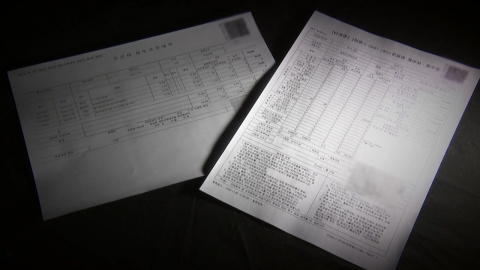KOSPI/KOSDAQ Plunges Nearly 3%...August's fear re-enactmentAfter Trump's election...Foreigners accelerate exodus from S. Korean stock markets
Our stock market fell again due to the Trump shock wave, falling to the 2,410 level.
Amid foreigners' departure and the "strong dollar" trend, the won-dollar exchange rate surpassed 1,410 won in two years.
Samsung Electronics shares hit their lowest price in four years and five months, raising concerns over "40,000 electronics."
Reporter Ryu Hwan-hong reports.
[Reporter]
Both the KOSPI and KOSDAQ indexes plunged nearly 3%, causing fears like Black Monday in early August.
Most of the top market cap stocks fell, while defense and virtual asset stocks, which were Trump beneficiaries, also fell.The main factor behind the
index's decline was also net selling by foreigners, which has been increasing since Trump's election.
[Kim Dae-joon / Senior Researcher at Korea Investment & Securities: In particular, it sells Korean market stocks such as Samsung Electronics, and has sold about 14.8 trillion won on the KOSPI for eight consecutive weeks. It's very interesting to know when this keynote will end.]
The KOSPI's market capitalization fell below 2,000 trillion won for the first time since "Black Monday" in August.
Samsung Electronics, the No. 1 market cap, hit its lowest price in four years and five months, with 40,000 electronics in front of it.
The won-dollar exchange rate surpassed 1,410 won again for the first time in more than two years following September 2022 as foreigners' departure from the stock market accelerated.
The won-dollar exchange rate rose to 1,411 won in early trading, but it broke to 1,410 won a day after surpassing 1,400 won, showing a steep rise.
Economists say the current high exchange rate reflects the crisis in our economy, and they are more concerned about the negative impact on import prices and financial markets than the gains made by exporters.
[Kim Mi-ru / KDI Researcher: The rise in the exchange rate could put some pressure on the recently stabilized consumer prices, especially the expansion of exchange rate volatility could also have a negative impact on the financial market, so the authorities need to keep a close eye on it.]
Lee Chang-yong, governor of the Bank of Korea, also said he would adjust the pace of the rate cut in consideration of the exchange rate, so the recent high exchange rate is expected to put pressure on the Bank of Korea to freeze the rate decision later this month.
I'm YTN's Ryu Hwan Hong.
Reporter for shooting
: Hong Deok-tae
Video editing: Han Soo-min
※ 'Your report becomes news'
[Kakao Talk] YTN Search and Add Channel
[Phone] 02-398-8585
[Mail] social@ytn.co.kr
[Copyright holder (c) YTN Unauthorized reproduction, redistribution and use of AI data prohibited]
Economy
More- "Seungjin's party." There's no..."Survival" selected year-end greetings.
- Seoul's monthly rent is running when loans are blocked...Increasing the burden of housing costs for ordinary people
- Production, consumption investment declines triple in five months of 'economic cold snap'
- The heavy snow killed more than 1,200 livestock...Government "inspection of simple livestock"

![[Exclusive] The head of the fire department's suspicious business trip abroad...Educational expenses increase after receiving invitations](https://image.ytn.co.kr/general/jpg/2024/1130/202411300500178437_h.jpg)





